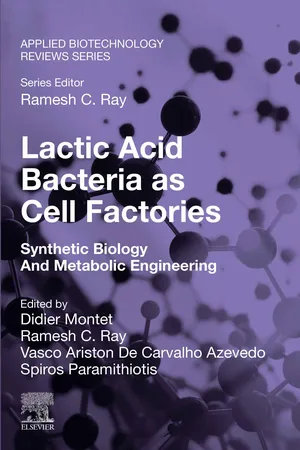
Lactic Acid Bacteria as Cell Factories
Synthetic Biology and Metabolic Engineering
- 438 pages
- English
- ePUB (mobile friendly)
- Available on iOS & Android
Lactic Acid Bacteria as Cell Factories
Synthetic Biology and Metabolic Engineering
About This Book
Lactic Acid Bacteria as Cell Factories: Synthetic Biology and Metabolic Engineering describes the most recent developments on the metabolic engineering and synthetic biology of Lactic Acid Bacteria (LAB) for production of biologically active biomolecules (enzymes, organic acids, bacteriocins, bioactive peptides, etc.), recombinant proteins, and their role in bioremediation. The book focuses on synthetic biology and metabolic engineering for the production of biologically active molecules such as bioactive peptides, polysaccharides, vitamins (Riboflavin), enzymes, organic acids (lactic and gamma-aminobutyric acid), flavor and aroma compounds, bacteriocins, recombinant proteins, etc.
Individual chapters are devoted to the production of biosurfactants and their applications and the bioremediation of heavy metals by LAB from aquatic environments. Two critical chapters address Genome editing of LAB: opportunities for food, feed and pharmaceuticals and A synthetic biology approach for plasmid DNA and Recombinant protein production. This book will be a valuable resource for those working in biology, biotechnology, biological engineering, chemical engineering, microbiology, food science and technology, genetics and synthetic biology.
- Explores the synthetic biology and metabolic engineering of lactic acid bacteria
- Highlights LAB enzymes such as phytase and amylase applications in food processing and the removal of anti-nutrients from foods and lignocellulose bioconversion
- Presents insights into biosurfactant production and possible applications
- Includes information on bioremediation by LAB, biofilm production mechanism, and plasmid and recombinant protein production using synthetic biology
Frequently asked questions
Information
Table of contents
- Cover image
- Title page
- Table of Contents
- Front Matter
- Copyright
- Contributors
- Preface
- 1: LAB as cell factories: A synthetic biology approach for plasmid DNA and recombinant protein production
- 2: Synthetic biology and metabolic engineering for improvement of lactic acid bacteria as cell factories
- 3: Overview of traditional, emerging, and future applications of LAB and most important contributions of genome editing tools for food, feed, and pharmaceuticals
- 4: Lactic acid bacteria in biorefineries
- 5: Lactic acid microbial production and recovery: Review and recent advances in bioprocess integration
- 6: Lactic acid bacteria for riboflavin production
- 7: Lactic acid bacterial cell factories for the production of gamma-aminobutyric acid
- 8: Use of exopolysaccharides from lactic acid bacteria to develop cereal-based food: Perspectives and challenges for Burkina Faso
- 9: Lactic acid bacteria for the generation of bioactive peptides
- 10: Lactic acid bacteria as potential sources of enzymes: From genes to industrial applications
- 11: Amylolytic lactic acid bacteria: Cell factories for direct lactic acid production from biomass by simultaneous saccharification and fermentation
- 12: Role of phytases from lactic acid bacterial species in level upgradation of bioavailable micronutrients in food applications
- 13: Production of flavor compounds by lactic acid bacteria in fermented foods
- 14: Lactic acid bacteria as biocontrol agents of food pathogens
- 15: Biotechnology of bacteriocins production by LAB
- 16: Synthetic biology approaches for biosurfactants production by lactic acid bacteria
- 17: Biosurfactants production by LAB and emerging applications
- 18: The reducing power of LAB in fermentation and biomass production
- 19: Bioremediation of heavy metals from aquatic environments by lactic acid bacteria
- 20: Lactic acid bacteria and Bifidobacterium as potential psychotherapeutics
- Index